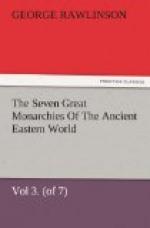The chief amusement of the court, in which however the king rarely partook, was hunting. Media always abounded in beasts of chase; and lions, bears, leopards, wild boars, stags, gazelles, wild sheep, and wild asses are mentioned among the animals hunted by the Median nobles. Of these the first four were reckoned dangerous, the others harmless. It was customary to pursue these animals on horseback, and to aim at them with the bow or the javelin. We may gather a lively idea of some of these hunts from the sculptures of the Parthians, who some centuries later inhabited the same region. We see in these the rush of great troops of boars through marshes dense with water-plants, the bands of beaters urging them on, the sportsmen aiming at them with their bows, and the game falling transfixed with two or three well-aimed shafts. Again we see herds of deer driven within enclosures, and there slain by archers who shoot from horseback, the monarch under his parasol looking on the while, pleased with the dexterity of his servants. It is thus exactly that Xenophon portrays Astyages as contemplating the sport of his courtiers, complacently viewing their enjoyment, but taking no active part in the work himself.
Like other Oriental sovereigns, the Median monarch maintained a seraglio of wives and concubines; and polygamy was commonly practised among the more wealthy classes. Strabo speaks of a strange law as obtaining with some of the Median tribes—a law which required that no man should be content with fewer wives than five. It is very unlikely that such a burden was really made obligatory on any: most probably five legitimate wives, and no more, were allowed by the law referred to, just as four wives, and no more, are lawful for Mohammedans. Polygamy, as usual, brought in its train the cruel practice of castration; and the court swarmed with eunuchs, chiefly foreigners purchased in their infancy. Towards the close of the Empire this despicable class appears to have been all-powerful with the monarch.
Thus the tide of corruption gradually advanced; and there is reason to believe that both court and people had in a great measure laid aside the hardy and simple customs of their forefathers, and become enervated through luxury, when the revolt of the Persians came to test the quality of their courage, and their ability to maintain their empire. It would be improper in this place to anticipate the account of this struggle, which must be reserved for the historical chapter; but the well-known result—the speedy and complete success of the Persians—must be adduced among the proofs of a rapid deterioration in the Median character between the accession of Cyaxares and the capture—less than a century later—of Astyages.




